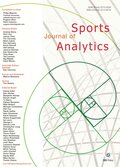Authors: Rocha da Silva, João Vítor | Rodrigues, Paulo Canas
Article Type:
Research Article
Abstract:
The NBA (National Basketball Association) is going through a transition process in its way of practice, planning, and comprehension of the game. With the exponential growth of the data that has been collected, detailed statistical analyses have been conducted for each part of the game. This has been overwhelmingly exploited in a way never seen before, especially when dealing with the three-point shot. In this paper, we are interested in characterizing NBA’s gameplay over time to identify trends and success factors. In particular, this study aims: (i) to identify which factors were crucial for teams’ regular season success in
…the past and understand the factors that are more relevant to succeed in the present day; and (ii) to group seasons and regular season winning teams into clusters of common characteristics and gameplay behavior. Historical events and trends help us to understand how teams were successful in past regular seasons, how they played, and how their style of play has changed. Leading to a better comprehension of the game. The game-related statistics of the NBA’s regular seasons, from 1979-80 to 2018-19, were analyzed using principal component analysis, cluster analysis, and LASSO regression. It is possible to identify three main Eras that we define as the Classic Era of the NBA (1980–1994), the Transitional Era of the NBA (1995–2013), and the Modern Era of the NBA (since 2013). As the results of this study make a historic analysis of the NBA, indicating the three eras of NBA regular seasons since the introduction of the three-point line, their playing styles, and their respective factors for success, this present research may be the base study that will help researchers better investigate the NBA, its past, present, and future.
Show more
Keywords: Basketball, data science, K-means clustering, LASSO regression, national basketball association, principal component analysis, sports analytics, statistics, unsupervised machine learning.
DOI: 10.3233/JSA-200525
Citation: Journal of Sports Analytics,
vol. 7, no. 4, pp. 263-275, 2021





